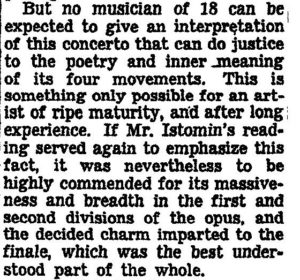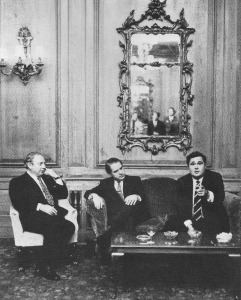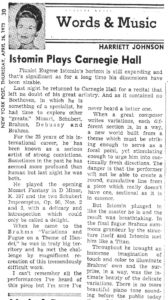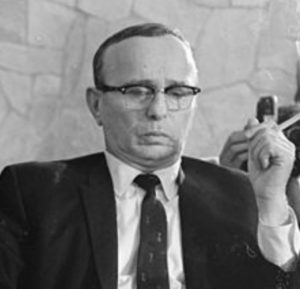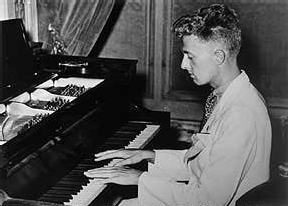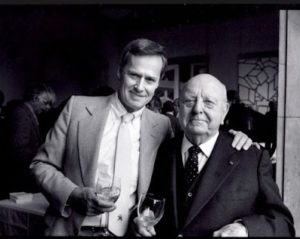“When the reviews are good, I’m unutterably happy for a few minutes. And when they’re bad, I’m unspeakably depressed and furious for the full day. But rarely has a review corresponded with what I actually thought about the concert. I’m enormously susceptible and anxious for observations and criticisms from everybody. And I listen and absorb any observations someone makes to me personally.’’
The golden age of reviewers and the reign of prejudice
It is difficult today to gauge the importance of reviews in American musical life from the 1940s to the 1970s. A considerable audience was discovering classical music and needed to be guided and to know what to think. When Istomin began his career, a concert at Carnegie Hall was the object of at least five reviews. Newspapers in all other major cities opened their columns wide to music critics, particularly in Chicago and Philadelphia. This omnipresence had its downside. The critics felt all-powerful. They were arrogant and had no scruples about making or breaking careers. They often lacked competence, and the pleasure of a witty remark, if possible a nasty one, sometimes outweighed musical integrity.
It was also the reign of prejudice and labelling!
- First of all, there was a marked reticence towards young American musicians: they might be considered virtuosos, but no one could imagine that their musicality would ever be equal to that of European or Russian performers.
- For a long time it was considered impossible that a pianist could excel in both Chopin and Beethoven. One excluded the other, and Istomin frequently included both in his recital programs. Invariably, at the same concert, some reviews praised his Beethoven and rejected his Chopin, while others did the opposite.
- Some works were supposed to be approached only by mature artists, notably the Beethoven Fourth Concerto and the Brahms Second. As Istomin had been playing them since he was eighteen years old, the critics took malicious pleasure in blaming him for his lack of maturity.
- A soloist could not perform chamber music, because he would be too anxious to stand out! Moreover, if a soloist dabbled in chamber music, it could only be because his solo career was in decline.
Istomin therefore confronted these four deeply-rooted prejudices head-on. He never indulged in making concessions in order to curry favor with the critics. There was no question of changing his concerto repertoire and recital programs, whose eclecticism disoriented critics. They had the greatest difficulty in making him fit into one of their categories: classic, romantic, or modern!
In addition, Istomin was ostracized by two of the most influential critics of the time: Claudia Cassidy and Harold Schonberg. The first, nicknamed ‘Acid Cassidy’, was the music editor of the Chicago Tribune from 1942 to 1966. She managed to obtain the resignation of three music directors of the Chicago Symphony: Désiré Defauw, Rafael Kubelik (Mrs. Cassidy hated the music of Bartók and Janáček!) and Jean Martinon. She despised Istomin, and reported negatively on almost all of his concerts in Chicago and at the Ravinia Festival. As for the second, Harold Schonberg, it was even more serious, due to the national and international prestige of The New York Times. Schonberg had succeeded, to the great displeasure of many musicians, in establishing himself as an inevitable reference. The fame and respectability conferred upon this critic at that time are very surprising, for his narrow-minded opinions now seem ridiculous. In any case, his stubbornly pernicious accounts, with the exception of the Trio’s concerts, severely damaged Istomin’s career in New York and beyond. [The New York Times and the Schonberg case are the subjects of a separate article.]
The same prejudices and penchant for labelling also prevailed on the other side of the Atlantic. When Istomin made his debut in Switzerland and Italy in 1950, all critics were thrilled by his ‘phenomenal’ technique, but could not pigeonhole him. Some praised his Bach and Mozart, others his Variations on a Theme by Handel, his Chopin or his Ravel, but none of them could imagine that one and the same pianist could excel in such different composers.
An anti-American disposition was widespread in Europe. American pianists were indisputably virtuosos, but their musical sensitivity and culture were questioned. In the 1960s and 1970s, there was also political resistance due to the Vietnam War. In England, Istomin had been very well received and was awarded the prestigious Harriet Cohen Medal in 1956. It had been created as a tribute to the great English pianist, whom Casals invited to Barcelona in the 1920s and whose career was prematurely interrupted after a domestic accident. But it seems that he did not show enough gratitude to the jury of critics who had conferred this distinction upon him, and it was construed as arrogance on his part. This grievance was reinforced when Istomin and his colleagues of the Trio challenged two of their strongest preconceived ideas: chamber music could not be played convincingly by soloists and had no place in large concert halls. They proved the opposite, and some critics had great difficulty in admitting it. All this resulted in tenacious hostility towards Istomin from The Times and a few other newspapers, and even from part of the British community, until the early 1980s.
The end of prejudice, but also of the power of reviewers
Of course, many journalists reviewed Istomin’s concerts very favorably, even in New York. Harriett Johnson, for example, who was a former student of Olga Samaroff and a distinguished composer of music for children, showed great empathy for him during her 43-year career at The New York Post. It is worth noting that the critics who were most enthusiastic about Istomin were musicians. However, these supportive reviews could not fully compensate for the persistent opposition of even a small part of the press. There is a saying that ten good reviews cannot wipe out one bad one!
The reception of Istomin’s concerts gradually changed as journalists were replaced. After Cassidy left, the Chicago press was unanimously thrilled with his May 1971 recital. In the early 1980s, London newspapers greeted him with enthusiasm, soon followed by the French, Swiss and Italian ones. Once Schonberg had retired, The New York Times no longer hesitated to give him rave reviews. For Istomin, this was satisfying, but by that time, reviews had lost much of their power and no longer had the ability to boost careers. The power had passed into the hands of the record companies and marketing specialists.
Istomin’s attitude towards criticism
Istomin had difficulty finding the right distance to avoid being upset by unfair reviews. His father had been so anxious and attached so much importance to the reviews that, after every concert in New York of his son, he passed a sleepless night while waiting for the newspapers of the next day, in order to read them as early as possible! Later on, Istomin was tempted into sharing the protests of his friend William Kapell, who was infuriated by the incompetence and arrogance of some journalists. Kapell did not hesitate to take up his pen and refute a criticism he considered inept, even threatening to punch the journalist in the face. He even came to blows with Jay Harrison of The New York Herald Tribune, who had written a shameful review of a Horowitz recital. Aware that this was leading nowhere, Istomin soon preferred to take refuge in humor. In March 1957, he played the Beethoven Emperor Concerto with the New York Philharmonic under the direction of Dimitri Mitropoulos, a conductor with whom he had always dreamed of collaborating. Harold Schonberg was particularly negative in The New York Times, blaming him for his harsh and percussive sound, and his inability to phrase. A few days later, The Daily News reported: ‘’Eugene Istomin, piano virtuoso, was soloist with the Philharmonic-Symphony last week and one of the music critics found a few faults in his performance. The pianist accepted the criticism philosophically. ‘Somebody must have given him anti-Istomin pills,’ said Eugene.’’
A few noteworthy reviews
One of the most remarkable is from famous writer and composer Paul Bowles, who was for a time a music critic at The New York Herald-Tribune, alongside Virgil Thomson. His review of Istomin’s first recital in New York at Town Hall on April 18, 1944 is remarkable for its foresight and open-mindedness: “One may not have agreed every time with Mr. Istomin’s very personal interpretations, but precisely because these were the result of a young artist’s intense feelings about music, and not a synthesis of other people’s ideas, they compelled the listener’s admiration.” (…) “Seldom does one hear Chopin played with such complete evidence of the pianist’s having understood its kind of poetry, and seldom does that poetry find an instrument so naturally adapted to its expression as Mr. Istomin’s sensitive fingers.’’
The most disconcerting review was that of a Lyon-based critic. After his performance of the Beethoven Fourth Concerto under Paul Paray, he described Istomin as “a typical American pianist, with steel fingers and a typewriter-like touch, without any musical sensitivity.” And he added: “But where did he find this incredible cadenza? There are limits to bad taste!” Istomin had played the cadenza written by Beethoven.
And finally, here is the delightful repentance of composer Virgil Thomson, who wrote in The Herald Tribune in February 1948: “Like many another young person of today he is not at his best in classic and romantic repertory… Only the music of his own century draws forth his full powers.“ Some thirty years later, Istomin had him read his review again and Thomson exclaimed: “Sorry, boy! Was I wrong!”

